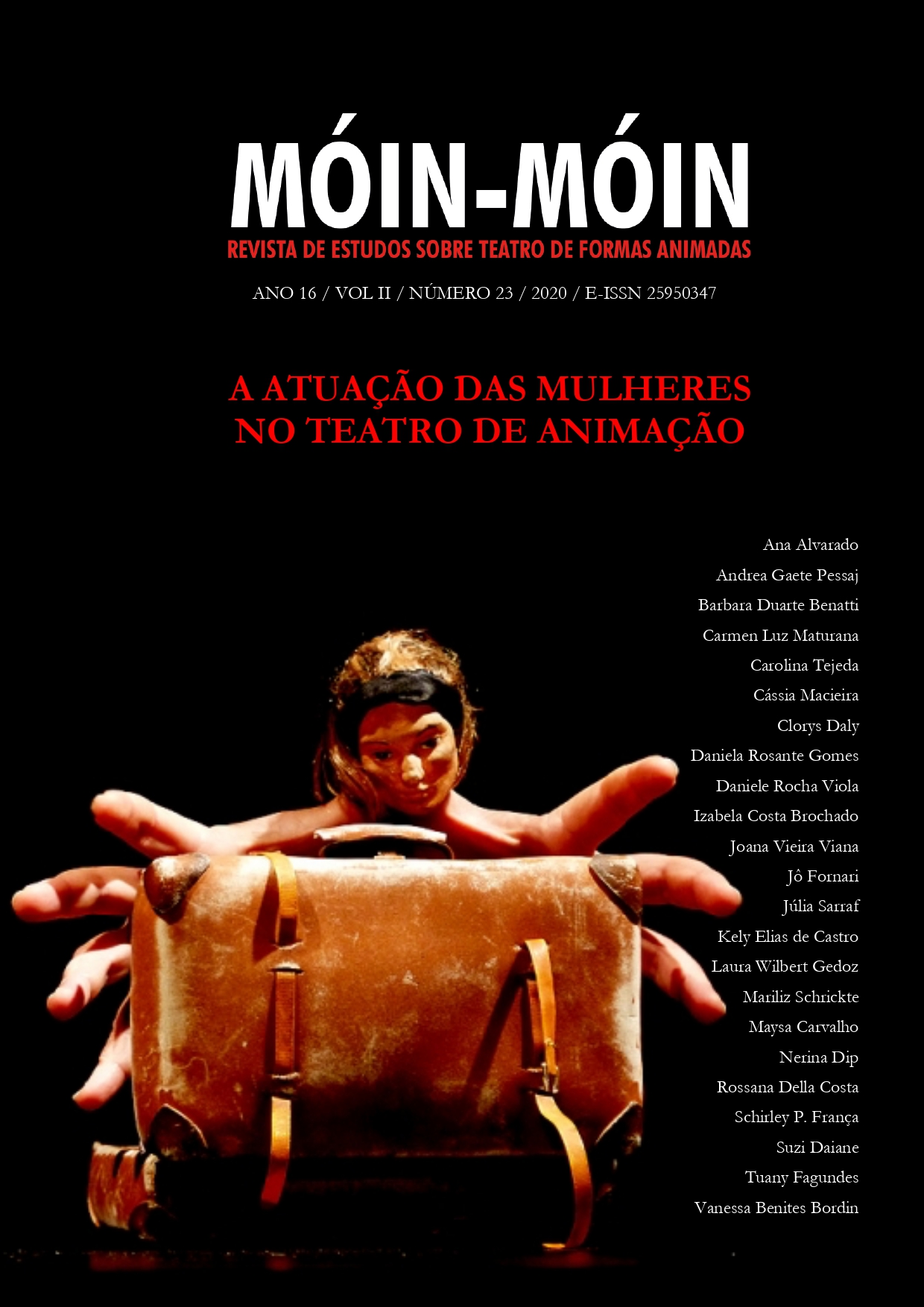Archetypes, madness and maternity in the Puppetry
DOI:
https://doi.org/10.5965/2595034702232020179Keywords:
O Quadro de Todos Juntos, Pigmalião Escultura que Mexe, ArquétiposAbstract
The article talks about the dramaturgical construction of the female characters of the
show O Quadro de Todos Juntos by the puppetry group Pigmalião Escultura que Mexe and
problematizes the representation of the maternal figure through correspondences with the
writings of Jung, Foucault and Beauvoir. The objective is to discover possibilities for questioning
female stigmas through artistic representation and contribute to reveal the foundations that
support the patriarchal and sexist imagery. The work reflects also about the construction of
evocative images in the production of a theater spectacle and the idiosyncratic processes of the
viewer reception.
Downloads
References
BEAUVOIR, Simone de. O Segundo Sexo. Rio de Janeiro: Nova Fronteira, 2009.
BÉRAIL, Brune de; MARY, Arthur. Scènes Psycologiques du Théâtre de Marionnettes. In: BEAUCHAMP, Hélène; GARCIN-MARROU, Flore; NOGUÈS, Joëlle; HAESEBROCK, Elise Van (Orgs). Les Scènes Philosophiques du Théâtre de Marionnettes. Montpellier: L’entretemps & Institut International de la Marionnette, 2016, p. 211-228.
JUNG, Carl. Os Arquétipos e o Inconsciente Coletivo. Rio de Janeiro: Vozes, 2000.
FOUCAULT, Michel. A História da Loucura na Idade Clássica. São Paulo: Perspectiva, 1978.
GUIDOLIN, Camila. FIANCO, Francisco. As ambiguidades do Iluminismo em algumas obras de Francisco de Goya: leitura de imagens. Revista Desenredo. - v. 13 - n. 2 - p. 328-348 - maio/ago. 2017. Disponível em: http://seer.upf.br/index.php/rd/article/view/7181. Acesso em: 29.jun 2020.
Downloads
Published
How to Cite
Issue
Section
License
Copyright (c) 2020 Móin-Móin - Revista de Estudos sobre Teatro de Formas Animadas

This work is licensed under a Creative Commons Attribution 4.0 International License.
The readers are free to transfer, print and use the articles published in the Magazine, as long as there’s explicit mention to the author(s) and to Móin-Móin Magazine - Studies in Theater of Animated Forms and there are no changes on the original work. Any other use of the texts needs to be approved by the author(s) and the Magazine. In submitting an article to Móin-Móin Magazine - Studies in Theater of Animated Forms and have it approved, the author(s) agree to give away, without payments, the following rights to the Magazine: first publishing rights and the license for the Magazine to redistribute this article and its metadata to index and reference services that the editors consider appropriate.
The articles whose author(s) are identified represent the author’s point of view and not the official position of Móin-Móin Magazine. The author(s) commit to always mention the publication in the following way when publishing work in reference to the article published in Móin-Móin Magazine:
“This article was originally published by Móin-Móin Magazine volume (insert the volume), number (insert the number), in the year of (insert year) and can be accessed on: http://www.revistas.udesc.br/index.php/móin"
Plagiarism in any way constitutes an unethical publishing behavior and is unacceptable. Móin-Móin Magazine holds the right to use software or other plagiarism tracking methods to scan the submitted works.
![]()
This journal uses Attribution-NonCommercial 4.0 International– (CC BY NC 4.0).






